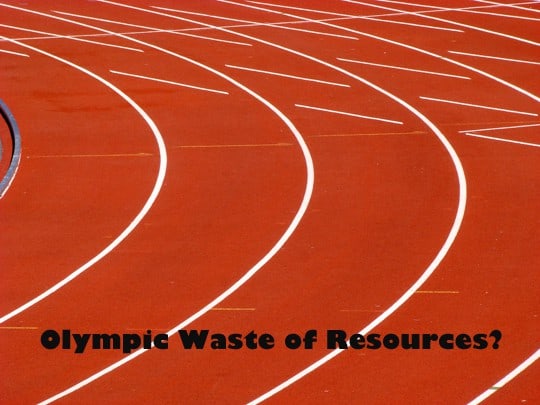How green are the Olympics? Is Olympic sustainability even possible? And what happens to all those Olympic training facilities once the games are over? Making the Olympics sustainable is a huge challenge, however, it is one we need to address quickly if the games are going to continue.
Posts feature partner companies & may be sponsored. Post contains affiliate links & I will be compensated if you make a purchase after clicking on links. As an Amazon Associate I earn from qualifying purchases.

Table of Contents
Watching the Olympic Games is a Tradition
Do you watch the Olympic games? In my house, the TV has been on for the last week and tuned to constant Olympic coverage. While I find it entertaining to watch, my husband is absolutely fanatical about cheering on our US athletes. I now recognize many of the athletes by name and country of origin just through subconscious osmosis of information.
What happens to Olympic cities and their newly created venues when the games are over? Many of these buildings are abandoned or torn down after the Olympics. These buildings cost millions of dollars and used an incredible amount of resources and energy to create yet they are destroyed?
Like this post about Olympic sustainability? Try these green living posts, too!
- Eco friendly Sports: What is your favorite activity doing to the environment?
- Managing Sports Teams with TeamSnap
- Youth Sports: Surviving a season of Chaos!
What does that say about us as a society? We build these huge complexes to use for only a few weeks and then just abandon them? I find that a pitiful waste of resources. It has cast a decidedly depressing pallor on an event I was really enjoying watching.

✯Don’t want to miss the next post?✯
Follow Turning the Clock Back on Facebook | Twitter | Pinterest
Or join the private Facebook group for simple tips on going green!
Olympic Waste of Resources
The 2004 Olympic games in Athens, Greece generated a ton of tourism money for a country that was struggling with significant financial problems. They went all out building impressive stadiums, pools, and other venues that now stand empty, crumbling, and in ruins. They even built a restaurant that was only open for ONE HOUR when the prime minister visited before the start of the Games. It never opened again.
A total of 36 new sites were either built or upgraded for the the 2004 Athens Olympics. Now, bankrupt, Greece has no money to pay for their upkeep. As a result, they are falling into ruins. Greece isn’t the only country to let their Olympic buildings fall apart. The only people who visit the Beijing Olympic ball field are tourists who want to visit the gift shop. No professional sports team has decided to rent it, so it sits crumbling.

Olympic Sustainability
Some cities are more successful than others at converting their Olympic stadiums and competition sites to something that will add long term value to their area. There is a photography project in progress right now that aims to look at the lasting effects (both good and bad) of the Olympics on host cities. Check out the video below from the authors of this book in progress for more info. Then, head over to The Olympic City to learn more about it.
How Much Money is Spent on the Olympic Games?
According to the estimates I found at The Daily Mail ,the current London Olympics is on course to spend close to 24 billion pounds (roughly $37 million USD according to current exchange rates). This money not only goes towards buildings but also an assortment of sculptures, trinkets and advertising. That is an incredible amount of money to spend on buildings only to let them fall into ruin as soon as the athletes go home.
From what I have read, London seems to have a pretty solid ‘post Olympic’ plan but so did all the other host cities and look how well that turned out. Organizers of this year’s Olympic events claim that it will be the “most sustainable” Olympics so far. With recycling, a zero waste goal, and sustainable seafood being served at restaurants, it is certainly showing promise. However, if the buildings are allowed to fall into ruin in the years to come, their carbon footprint will still be huge.

Is Olympic Sustainability Possible?
I usually like to write my Think About This Thursday post to help my readers bring about change in their lives or in their communities. However, I truly do not think there is anything to be done about this situation other than raise awareness of the problem. The governing body of the Olympic games has developed a sustainability strategy in recent years that may help. I hope this helps….
As a society, we have become addicted to bigger, better, flashier and more expensive Olympic events. I don’t see people going back to the way things were done in Ancient Greece. Naked athletes being awarded vats of olive oil for their Olympic victory would probably not draw very many competitors. Spectators, yes. I would sit down to watch that any day! But, from food waste to disposable buildings, the Olympics has a long ways to go before they are sustainable.

For Further Reading:
Disclaimer: The word “Olympic” and the Olympic rings symbol are trademarks of the International Olympic Committee (IOC) and are used in connection with this post under the Fair Use Doctrine covering commentary and criticism.

Diane is a professional blogger and nationally certified pharmacy technician at Good Pill Pharmacy. She earned her BS in Microbiology at the University of New Hampshire and has worked in cancer research, academics, and biotechnology. Concern over the growing incidence of human disease and the birth of her children led her to begin living a more natural life. She quickly realized that the information she was learning along the way could be beneficial to many others and started blogging and freelance writing to share this knowledge with others. Learn more about her HERE.

We love the Olympics but I’d honestly never considered this. Thanks!
Wow. That is definitely something to think about… I was wondering how much $$ was spent on upgrading and building!! So sad that Greece is having such troubles…
Hosting the Olympics eats more finances than it generates. I never got why so many cities compete for the “honor” of hosting.